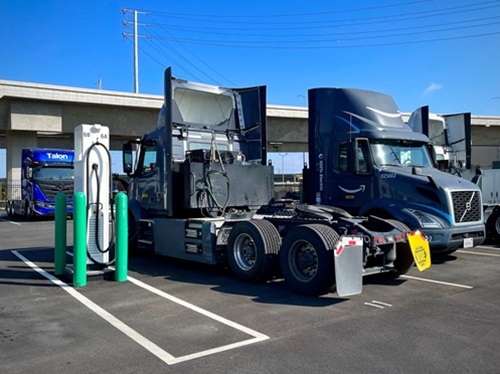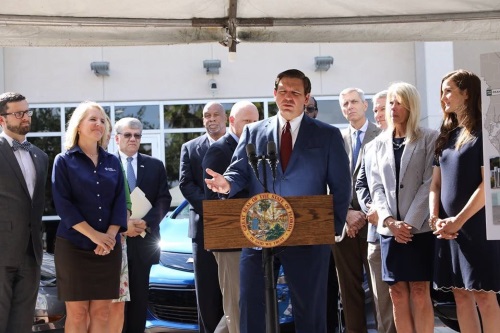Although Florida trails other big states in government support for electric vehicle infrastructure, the Florida Department of Transportation is now taking a lead role in building out an EV recharging network, according to a new report.
[Photo courtesy of the Florida Governor’s Office.]
The Southern Alliance for Clean Energy and Atlas Public Policy recently published “Transportation Electrification in Florida,” a brief that makes the case that Florida’s government has not kept pace with its own citizens in transitioning to EV transportation. Floridians purchase 4 percent of all EVs in the country, but Florida’s government only spent $23.3 million on EV infrastructure, representing about 1 percent of all states’ spending, according to the report.
This has put Florida is in a “really unique situation” because it is second in the country in EV sales and number of chargers, but only 18th in per-capita sales and 30th in per capita chargers, according to Stan Cross, Electric Transportation Policy Director for SACE.
“What that means is that Florida runs the risk in getting behind in charging really quickly,” Cross said. “If numbers [of EV buyers] go up quickly, Florida can’t keep up.”
However, the Florida DOT is not only playing catch up, it is working to get ahead of the curve with a stated goal to “position Florida as a national leader in EV adoption and infrastructure,” according to a presentation to other agencies and stakeholders.
As a result, the agency is developing an EV charging infrastructure master plan for the state and preparing legislative initiatives to encourage even more EV usage. These actions were the result of the new Florida Essential Infrastructure Law that puts the Florida DOT and other state agencies in the EV business.
Right now, the agency is modeling location criteria for EV charging sites, formulating an implementation strategy, and forecasting future EV usage and its impact to the state’s Transportation Trust Fund – largely fueled by gasoline and diesel taxes. Florida DOT’s effort is comprehensive, including support of EV transit and school bus fleets and integration with hurricane and disaster evacuation plans.
“The [Florida] DOT is thinking through what some of the policy implications are for moving the needle, the principles that should drive the state’s thinking on this,” Cross said. “[They] have a lot to figure out, and they’ve put many of the right policy recommendations on the table.”
In a recent blog, Cross noted that many of the policies the Florida DOT is studying “are aligned with policy considerations being implemented successfully” in other states, including promoting EV usage throughout the state, supporting rural infrastructure development and study incentives to potential EV buyers and to utility companies to help build charging stations. Most of Florida DOT’s work is in the planning stages as it prepares to issue a status report with preliminary recommendations to the governor by December 1.
 Electric Vehicles
Electric Vehicles



